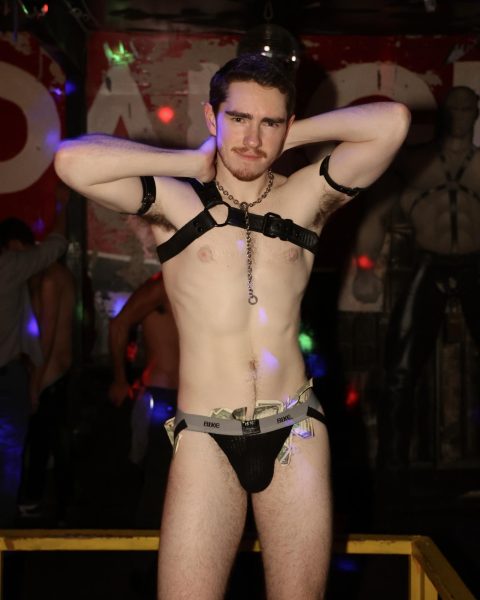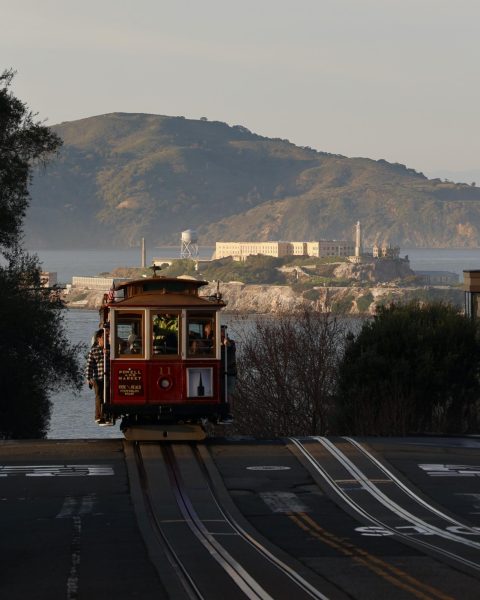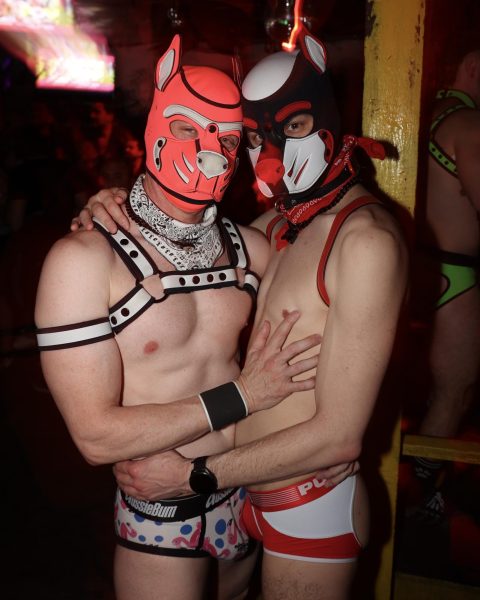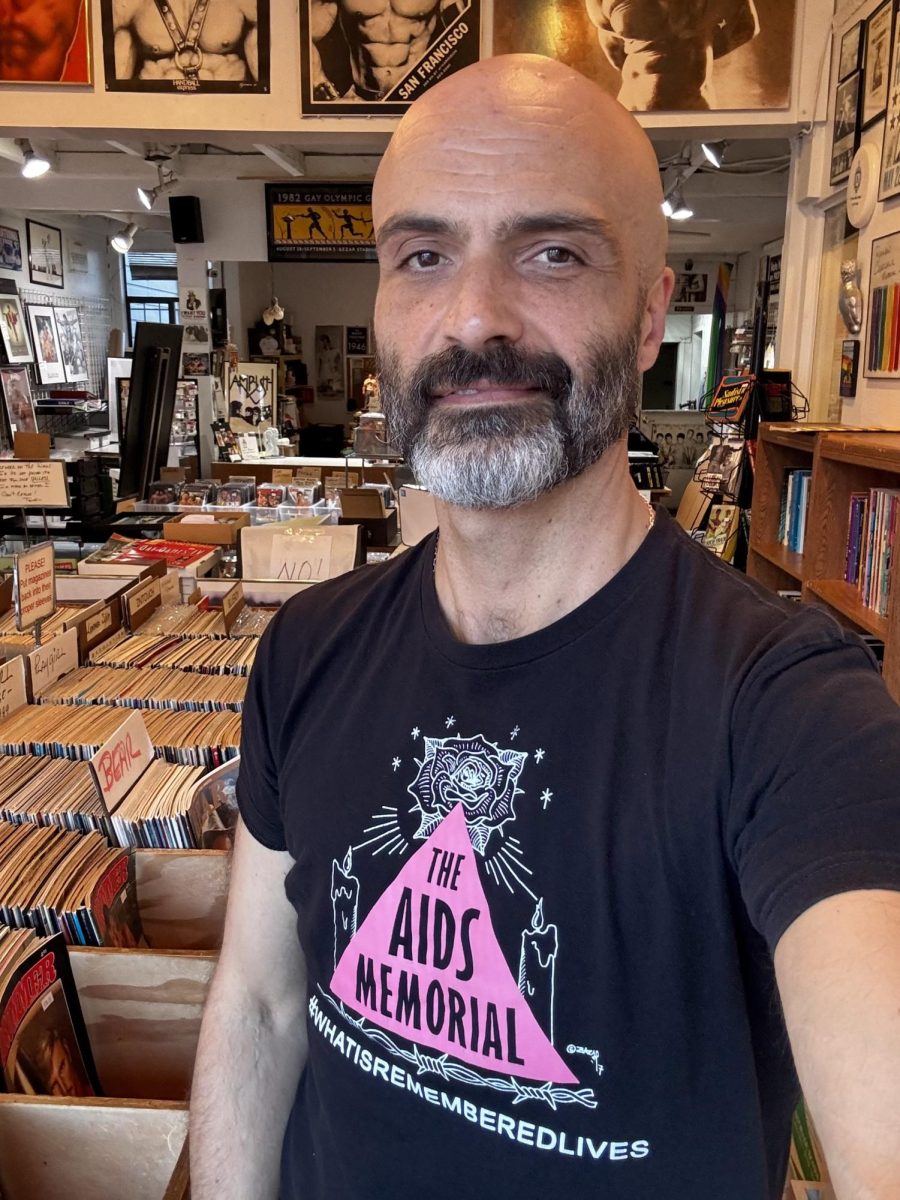Bradley Roberge sat serenely at Another Cafe in Nob Hill and, despite a varied and unorthodox career behind and ahead of him, downplays his accomplishments with a smile. His career that traces up and down the West Coast, involves saving a store, and is lush with a wide range of work. For Roberge, this is just the beginning.
Professionally, Roberge freelances for different companies such as Cut + Run, an advertising company, and as an office manager who offers client services. He also manages social media for Auto Erotica, an erotica shop in San Francisco’s Castro District, and works as the in-house photographer for Stank, an armpit fetish party hosted monthly at the gay bar, Powerhouse. Who says you can’t mix the personal with the professional?
“Except for my day job, all of my jobs are really gay, but I wouldn’t really want it any other way. You know, I wish my day job was gayer,” Roberge said. “I feel like I photograph moments. Whether it is that building in the Embarcadero or those boys sniffing each other in that party, I really try to capture a moment or how I felt when I looked at it.”
At Another Cafe, Roberge’s casual, unforced assurance in posture, both physical and professional, actively intrigues as he makes fascinating conversation that challenges his reserved nature. There’s a confident openness to what he shares and a perpetual mystery to what he doesn’t, though not a spiky one. His presence is imposing without ever being imposing, Roberge seems at peace with his reservations and with himself.
Patrick Batt, the owner of Auto Erotica, knows all too well about having reservations, Roberge’s and his own alike. At the start of the pandemic, Auto Erotica, the world’s only brick-and-mortar erotica shop, was at risk of closure. That’s when Roberge stepped in.

“Bradley kept coming around, saying, ‘Oh, we’ve got to save the store. We’ve got to do this, we’ve got to do that,’ and had to convince me to do what I didn’t want to do, especially the GoFundMe,” Batt said. “That was like me standing on the street corner begging, and that’s not how I operate, but it was the right thing. In retrospect, he saved my ass, and I tell everybody.”
That GoFundMe is one Roberge pushed Batt to open in the wake of the first months of the pandemic. Roberge wanted to get as many eyes on the store as humanly possible to help its situation, so he turned to social media. Auto Erotica had a dormant Instagram account that Roberge took the reins of and it quickly amassed a large following, across the country and internationally. One of the more committed followers is Jeremy Stilb, a documentarian who is now working on a documentary about the shop.
“Auto Erotica is a place I’ve been visiting for years,” Stilb said. “I come from Austin, and I was really fascinated with Drummer Magazine and the graphic design, the typesetting, the way the images were captured; it was just very startling. It felt so striking and considered. I think my first brushes with gay culture were really tacky ‘90s stuff, ‘Queer as Folk,’ six-pack abs and then I think something like Butt Magazine really opened my mind to what queer culture used to be. Going to Auto Erotica, getting a peek into the past, it felt like it was kind of like our origin story.”
The treasure trove of gay history that Batt provides the city and the world with Auto Erotica gave Roberge various projects beyond running socials. He loved scanning and going over vintage magazines, photos and art. Eventually, he knew he had to share those scans, too.
“With Instagram, I had these scans and visuals and now we could share it with people,” Roberge said “Then it started to do really well, and that took off, and all of a sudden, he [Batt] would see we would get like 100 followers a day or more, and it would just blow his mind. And he couldn’t wrap his head around what Instagram was. All that to say, it just kind of took off and became its own thing. Now, like I’m doing that.”
Describing a monumental achievement in the preservation of gay culture in San Francisco and deflecting it as just one casual thing he does is something Roberge loves to do.
When he’s not busy saving historic parts of the Castro, Roberge chases his love for photography. What he calls a hobby seems more of a passion and compulsion. His photos range far and wide. From twunks sniffing daddies at Powerhouse, illuminated in sweat and rave lights, to austere landscapes of San Francisco landmarks and city nooks that add new and tender dimensions to the city’s most and least recognizable spots, all of Roberge’s photos have a singular eye. Where that eye came from, he couldn’t say.

“I can’t look at anything without trying to figure out how I take a picture of it, truly. Like even now, when I’m talking to you, my brain’s like looking at these houses and like…,” said Roberge, as he gestured to a row of San Francisco-staple Queen Annes. “Yeah, I don’t know, it is a compulsion, literally.”
Roberge’s passion goes hand-in-hand with his presence, which reads gentle and curious. These are traits he shares with his photography, itself an extension of him. His friends know this all too well about him.
“He has a very commanding presence, so he can look a little intimidating from afar. Yet he has this really beautiful voice with a very, very gentle disposition,” Stilb said. “So it’s like the image is one thing, and then the actual person is really sweet and inviting and soft.”
Roberge’s friend, Nick Rice, lives states away in Seattle, yet he knows Roberge and bonded with him through their shared love for gay history and unearthing the culture that came before them both.
“We met mostly out in nightlife, so that’s where we met initially, and by knowing about his connections,” Rice said. “We just kind of connect, usually, through an interest in history. So that’s a lot of what we talk about together.”
That passion for nightlife comes through in the line between the personal and professional that Roberge treads and often crosses in his work. His photography for Stank is erotic and playful as he captures the throes of nightlife, throwing all caution to the wind with abandon. The passion that comes through in his photography stems from a very real place as Ricky Kelly, Roberge’s friend, knows and shares.
“Something he and I have in common is we both really value nightlife and queer history, so it makes hanging out very easy. But in those spaces, there’s a lot of history,” Kelly said. “So we would have a lot of conversations about the history of different bars or the leather scene, and the ways that it would show up in San Francisco and how that connects to some of the nightlife origins. Going down these rabbit holes often brings us to talk about the history of queer people, especially gay men who came before us or are from other generations that helped to birth the world we get to live in. San Francisco feels like a place we share a common appreciation and gratitude and interest in.”
Roberge’s passion is fiery yet kept behind the eyes: his ultimate tool. When speaking, his eyes can pierce through you in a way that never feels like he’s looking through you but through and into you. That particular nerve he can strike with a glance is what makes his photography so evocative, whether it be a sweat-glistened leather daddy or a cherry blossom tree in full bloom. No matter the subject, if his lens is on it, it will be treated with care.

That lens isn’t just his camera’s either. Care is what marks his work in any and every field. If he didn’t care, Auto Erotica wouldn’t still be thriving as the gay beacon it is. In spite of how humble Roberge likes to stay about what he’s done, Batt knows how much he’s accomplished.
“On Saturdays, when he’s here, I’ll say, ‘Oh, this is the guy that does the Instagram.’ He almost seems embarrassed about it, but it’s all his vision, his eye, it’s his,” Batt said. “He’s in that sweet spot of our followers; a large chunk of our followers are 25 to 54, and he’s like 46. So he just has an eye for what that age group seems to want to see, and I just look at the likes. I’m impressed by the likes; I’m also impressed by the fact that we’re known worldwide. I mean, people come in here from all over the fucking world based on Instagram. They come to San Francisco.”



Scott • May 14, 2025 at 11:21 pm
I really appreciate this bio! Thank you for turning the gaze back at Mr Roberge — I’ve admired his work for years and always wanted to learn more about the man himself. I knew he was connected to Autoerotica but didn’t understand it was to quite this extent. Keep it up, Bradley, San Francisco wouldn’t be the same without you.